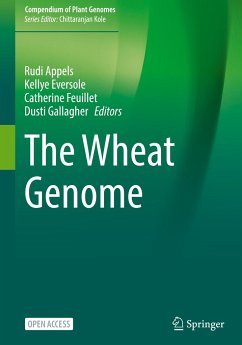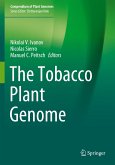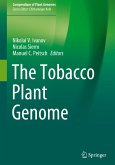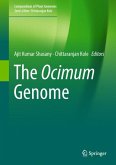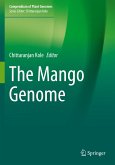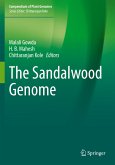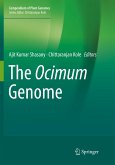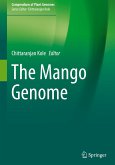The Wheat Genome
Herausgegeben:Appels, Rudi; Eversole, Kellye; Feuillet, Catherine; Gallagher, Dusti
The Wheat Genome
Herausgegeben:Appels, Rudi; Eversole, Kellye; Feuillet, Catherine; Gallagher, Dusti
- Gebundenes Buch
- Merkliste
- Auf die Merkliste
- Bewerten Bewerten
- Teilen
- Produkt teilen
- Produkterinnerung
- Produkterinnerung
This open access book provides the first comprehensive coverage of the wheat genome sequence since the publication of the draft and reference sequences for bread wheat and durum wheat. It presents an overview and all aspects of the gold standard sequence of the bread wheat genome, IWGSC RefSeq v1.0 and its subsequent improvements through 2022 (IWGSC RefSeq v2.1), as well as the sequencing of multiple elite wheat varieties, durum wheat, and ancient wheat. The book provides a broad and extensive review of the resources, tools, and methodologies available for exploiting the wheat genome sequence…mehr
Andere Kunden interessierten sich auch für
![The Tobacco Plant Genome The Tobacco Plant Genome]() The Tobacco Plant Genome134,99 €
The Tobacco Plant Genome134,99 €![The Tobacco Plant Genome The Tobacco Plant Genome]() The Tobacco Plant Genome134,99 €
The Tobacco Plant Genome134,99 €![The Ocimum Genome The Ocimum Genome]() The Ocimum Genome75,99 €
The Ocimum Genome75,99 €![The Mango Genome The Mango Genome]() The Mango Genome181,89 €
The Mango Genome181,89 €![The Sandalwood Genome The Sandalwood Genome]() The Sandalwood Genome119,99 €
The Sandalwood Genome119,99 €![The Ocimum Genome The Ocimum Genome]() The Ocimum Genome75,99 €
The Ocimum Genome75,99 €![The Mango Genome The Mango Genome]() The Mango Genome127,99 €
The Mango Genome127,99 €-
-
-
This open access book provides the first comprehensive coverage of the wheat genome sequence since the publication of the draft and reference sequences for bread wheat and durum wheat. It presents an overview and all aspects of the gold standard sequence of the bread wheat genome, IWGSC RefSeq v1.0 and its subsequent improvements through 2022 (IWGSC RefSeq v2.1), as well as the sequencing of multiple elite wheat varieties, durum wheat, and ancient wheat. The book provides a broad and extensive review of the resources, tools, and methodologies available for exploiting the wheat genome sequence for crop improvement and studying fundamental questions related to the structure, function, and evolution of the wheat genome. Wheat (Tritcum aestivum L.) is the most widely grown crop in the world, contributing approximately 20 percent of total calories and more protein in human diets than any other single source. This book is useful to students, teachers, and scientists in academia andindustry interested in gaining an understanding of the wheat genome and its application as well as plant scientists generally interested in polyploid plant species.
Produktdetails
- Produktdetails
- Compendium of Plant Genomes
- Verlag: International Wheat Genome Sequencing Consortium / Springer / Springer International Publishing / Sp
- Artikelnr. des Verlages: 978-3-031-38292-5
- 1st ed. 2024
- Seitenzahl: 336
- Erscheinungstermin: 14. November 2023
- Englisch
- Abmessung: 260mm x 183mm x 24mm
- Gewicht: 831g
- ISBN-13: 9783031382925
- ISBN-10: 3031382927
- Artikelnr.: 68251841
- Herstellerkennzeichnung Die Herstellerinformationen sind derzeit nicht verfügbar.
- Compendium of Plant Genomes
- Verlag: International Wheat Genome Sequencing Consortium / Springer / Springer International Publishing / Sp
- Artikelnr. des Verlages: 978-3-031-38292-5
- 1st ed. 2024
- Seitenzahl: 336
- Erscheinungstermin: 14. November 2023
- Englisch
- Abmessung: 260mm x 183mm x 24mm
- Gewicht: 831g
- ISBN-13: 9783031382925
- ISBN-10: 3031382927
- Artikelnr.: 68251841
- Herstellerkennzeichnung Die Herstellerinformationen sind derzeit nicht verfügbar.
Kellye Eversole is a pioneer in agricultural genomics, biotechnology, and the development of international, pre-competitive, industry-academic research. Since 1994, she has led consortia and projects to obtain reference genome sequences for agriculturally important crop, livestock, and poultry species. She leads, since 2005, the International Wheat Genome Sequencing Consortium, the international, public-private consortium that obtained the reference sequence of the bread wheat genome and, since 2016, the International Alliance for Phytobiomes Research which is pioneering a holistic, systems approach to understand the complex interactions between the biological and geophysical components of agricultural production systems and support the development of novel, site specific products for enhanced sustainability. In addition to her work in genomics and convergent systems, Kellye advises public and private entities on their scientific strategies and regulations related to agricultural biotechnology/genetic engineering, microbial products, and plant protection products. Kellye also assists venture capital firms in due diligence of start-up companies in the agricultural space. She was elected as a Fellow of the American Association for the Advancement of Science for her work in plant and microbial genomics and has published widely in top tier journals including multiple articles in Science and Nature. Kellye grew up in Oklahoma in a farming and ranching family, the early agricultural foundation of which led her to pursue a career of service in support of the agricultural enterprise. She founded Eversole Associates in 1991 following professional training in political science and philosophy (Oklahoma State University, George Washington University, and Georgetown University) and working as a professional staff member in the US Senate. She co-owns a wheat & cotton farm in southwestern Oklahoma. Rudi Appels carried out his first DNA preparation onleaves from rye, bread wheat and triticale in 1977, with WJ Peacock in CSIRO Division of Plant Industry with the aim of isolating molecular probes for rye chromosomes in wheat-rye translocation lines and new triticales. The success of this research (pre-DNA cloning) was followed up during his 27 years in CSIRO in isolating many economically important genes from wheat. Rudi started to make research visits to Beijing, through a project with Xin Zhiyong, in 1988 which culminated in a successful, large, Australia-China proposal with Prof. Zhonghu He in 2013. He moved to take up a joint appointment in Murdoch University/Dept of Agriculture WA, in 2001, to work more closely with wheat breeders and from 2004/5 was (and continues to be) active in founding and co-leading the International Wheat Genome Sequencing Consortium. Since 2015, he has taken up honorary appointments with the University of Melbourne and Agriculture Victoria and is based in Melbourne. Dusti Gallagher is a leader in plant genetic research and crop development. She is the President and CEO of Heartland Plant Innovations, an advanced plant breeding services company; and President and CEO of Fritz Consulting, a Kansas-based agricultural consulting firm. She has 25 years of experience in hands-on research, research management, organizational leadership and management, employee recruitment, staff and board development, strategic and financial planning, project management, goal initiation and execution, as well as in public policy related to agriculture. Gallagher also serves as an associate of Eversole Associates and, in this capacity, she provides leadership and project management for collaborative initiatives including the International Wheat Genome Sequencing Consortium, the International Alliance for Phytobiomes Research and the U.S. Culture Collections Network. A native of Oklahoma, Dusti received bachelor's and master's degrees in Agricultural Economics from Oklahoma State University. Dusti currently resides in Wamego, KS, USA, with her husband Paul and two children, Maya and Nathanael. Catherine Feuillet received her PhD in plant biotechnology in 1993 followed by 10 years of postdoctoral studies and serving as an assistant professor at the University of Zurich. While in Zurich, she developed research projects aiming at the isolation of disease resistance genes and a better understanding of the genome structure and evolution of wheat and barley. In 2004, she was appointed by INRA in France as a research director to lead wheat genomics projects in support of wheat improvement. In 2013, Catherine joined Bayer CropScience as the head of Trait Research where she served until April 2018 when she joined Inari, a start-up aiming at transforming plant breeding, as the Chief Scientific Officer. Catherine has coordinated several large national and European projects and is one of the founders of the International Wheat Genome Sequencing Consortium. She was elected the French "golden woman of the year for research" in 2008. Then, for her achievement in wheat research, she received in 2009 the "Prix Foulon" from the French Academy of Sciences. She received the French Legion of Honour in 2010, was elected a Fellow of the American Association for the Advancement of Science in 2011, and received the "Prix J. Dufrenoy" from the French Academy of Agriculture in 2012. Catherine has supervised the work of more than 30 masters, doctoral, and postdoctoral scientists and published more than 120 scientific papers in peer reviewed journals and books.
Introduction.- IWGSC RefSeq bread wheat reference genome sequence.- Wheat genomic resources and their role in wheat research.- Wheat genome structural and functional annotation.- The wheat transcriptome and discovery of functional gene networks.- Genome-wide resource development to accelerate gene discovery and functional analysis in wheat.- Genome-editing technology applications in wheat breeding.- Wheat genetic diversity explored through genomic approaches.- Dawn of the wheat pangenome: sequencing the genomes of 10+ elite lines.- Sequencing ancient wheat to illuminate the history of domestication.- Genome sequences from diploids and wild relatives of wheat for comparative genomics and alien Introgressions.- The impact of the durum wheat genome in identifying new germplasm for breeding.- Haplotype mapping in globally diverse germplasm for genomic-assisted wheat breeding.- Genome-informed discovery of genes and association with wheat traits.- Genomic insights on global journeys of adaptive wheat genes that brought us to modern wheat.- Genomic selection in wheat utilizing the reference sequence.- Rapid cloning of disease resistance genes in wheat.
Introduction.- IWGSC RefSeq bread wheat reference genome sequence.- Wheat genomic resources and their role in wheat research.- Wheat genome structural and functional annotation.- The wheat transcriptome and discovery of functional gene networks.- Genome-wide resource development to accelerate gene discovery and functional analysis in wheat.- Genome-editing technology applications in wheat breeding.- Wheat genetic diversity explored through genomic approaches.- Dawn of the wheat pangenome: sequencing the genomes of 10+ elite lines.- Sequencing ancient wheat to illuminate the history of domestication.- Genome sequences from diploids and wild relatives of wheat for comparative genomics and alien Introgressions.- The impact of the durum wheat genome in identifying new germplasm for breeding.- Haplotype mapping in globally diverse germplasm for genomic-assisted wheat breeding.- Genome-informed discovery of genes and association with wheat traits.- Genomic insights on global journeys of adaptive wheat genes that brought us to modern wheat.- Genomic selection in wheat utilizing the reference sequence.- Rapid cloning of disease resistance genes in wheat.

